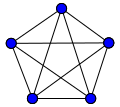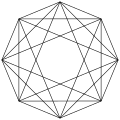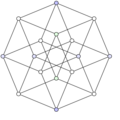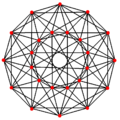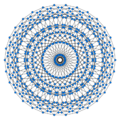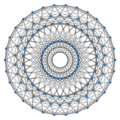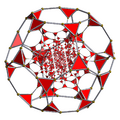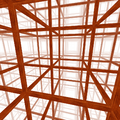Polychoron facts for kids
In the world of geometry, a polychoron is a special shape that exists in four dimensions. Think of it as the next step up from shapes you already know! The word "polychoron" comes from two Greek words: poly, meaning "many," and choros, meaning "room" or "space."
You know a polygon is a flat shape with many sides, like a square or a triangle. And a polyhedron is a 3D shape with many flat faces, like a cube or a pyramid. Well, a polychoron is the four-dimensional version of these shapes! It's sometimes called a 4-polytope.
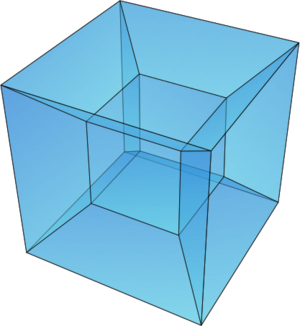
Contents
What is a Polychoron?
A polychoron is a shape that has "parts" in four dimensions. Just like a cube has faces (which are 2D squares) and edges (which are 1D lines), a polychoron has different kinds of parts.
- It has vertices, which are like corners.
- It has edges, which are lines connecting the corners.
- It has faces, which are flat 2D shapes like triangles or squares.
- And it has cells, which are 3D shapes like cubes or pyramids. These cells are the "building blocks" of the polychoron.
Imagine trying to draw a 3D cube on a flat piece of paper. It looks a bit squished, right? We do the same thing to draw a 4D polychoron. We draw it in 3D space, which makes it look a bit distorted, but it still helps us understand its parts and how they connect.
Famous Polychora
There are many different kinds of polychora, but some are more famous than others.
The Tesseract
The tesseract is probably the most well-known polychoron. It's also called a "4-cube" because it's like a cube, but in four dimensions. Just as a cube has 6 square faces, a tesseract has 8 cube-shaped "cells."
If you could "unfold" a tesseract, you would see these 8 cubes connected together. It's a bit hard to imagine, but it's a very cool shape!
Regular Polychora
In geometry, "regular" shapes are those where all the sides and angles are the same. For example, a square is a regular polygon, and a cube is a regular polyhedron.
In four dimensions, there are only six special shapes that are "regular" polychora. These are:
- The 5-cell (also called a pentachoron)
- The 8-cell (this is the tesseract!)
- The 16-cell (also called a 4-orthoplex)
- The 24-cell
- The 120-cell
- The 600-cell
These shapes are very symmetrical and have amazing properties, even if they are hard to picture in our minds!
Images for kids
See also
 In Spanish: Polícoro para niños
In Spanish: Polícoro para niños
 | Madam C. J. Walker |
 | Janet Emerson Bashen |
 | Annie Turnbo Malone |
 | Maggie L. Walker |


